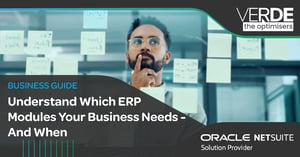What Are ERP Modules?
An Enterprise Resource Planning (ERP) system is like the central nervous system for a business, collecting and organising key information to support lean, efficient operations, even as it expands. The ERP platform automates business processes and provides insights and internal controls, drawing on a central database that collects inputs from various departments.
Once information is compiled in that central database, leaders gain cross-departmental visibility that empowers them to analyse various scenarios, discover process improvements and generate major efficiency gains. That translates to cost savings and better productivity as people spend less time digging for needed data or completing mundane tasks.
ERP systems typically come with several modules that are like building blocks for the software used to run the world’s businesses, whether they make hundreds of thousands or hundreds of billions of dollars in revenue every year. Each module brings a bundle of functionality that helps complete a particular process, or a part of that process.
These building blocks help various departments, from finance to supply chain to sales, perform their individual functions. The modules connect to the ERP’s common database and should easily integrate with one another to ensure every department has accurate, consistent data and support interconnected business processes.
The end game is that employees can access the information they need to answer questions about their department’s current performance, target areas for improvement, assist with future planning and collaborate with other teams.
Again, all of these modules interact with each other in a way that often augments their
capabilities. For example, an eCommerce manager can find the original purchase order
for a particular product to ensure an upcoming promotion will still leave room for an acceptable profit margin. The finance department may review data that originates in the CRM about salespeople’s commission earnings to make sure they’re compensated appropriately.
Years ago, an on-premises ERP was the sole option, and privy only to the largest, most deep-pocketed companies. ERP implementations were extensive and extremely time-consuming projects, so many companies implemented everything at once, maybe never even “turning on” or under-using certain modules. They may not have needed that functionality right away but took a just-in-case approach to ensure they could leverage it, if necessary, without enduring another lengthy project.
Then came the cloud, which revolutionised ERP by vastly simplifying the process of
implementing a system and scaling its functionality. For the first time, the promise of modular ERP was truly fulfilled—the company didn’t have to build out the hosting infrastructure and implement a bulky system, but rather could start with only the functionality it needed and add more as it evolved.
The cloud put the benefits of ERP within reach of the smallest businesses since it removed the long, painful implementations and high upfront costs of legacy systems. The subscription-based pricing of a cloud system played a part here, too. ERP could be taken off the balance sheet as a capital project, and put onto the books as an operating expense, meaning functionality could be implemented and paid for as the business
actually needed it.
So what can these ERP modules do and how can your business start to put them together to build a competitive advantage?

|
Download the Business Guide - Understand which ERP modules your business needs to learn which ERP modules your business needs and how can your business start to put them together to build a competitive advantage, including:
|

